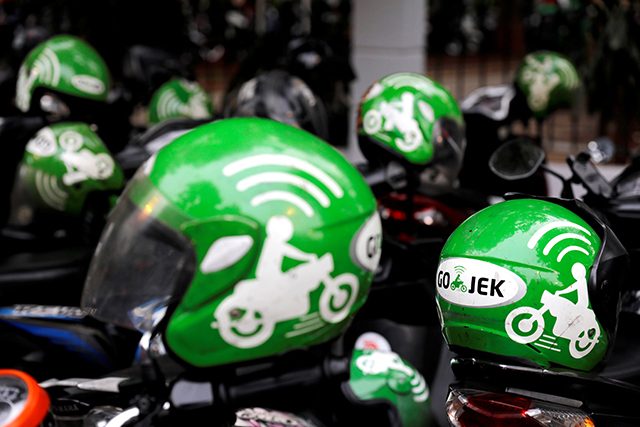
JAKARTA — Indonesia is preparing to launch regulations fixing the rates drivers and riders for ride-hailing services such as Grab and Go-Jek receive, two government officials said this week, creating potential obstacles for the companies’ expansion.
The regulations would meet drivers demands for more oversight and higher rates but there are concerns that the rising costs to the companies could stifle their development as they battle to dominate the ride-hailing market in Southeast Asia‘s biggest economy.
Singapore-based Grab and home grown Go-Jek have been locked in price wars in Indonesia, part of a wider fight to bring banking, e-commerce, ride-hailing, food-delivery and other services to every corner of Southeast Asia.
However, since 2018, motorcycle taxi drivers working for Grab and Go-Jek in Jakarta have held protest rallies calling for higher fares and better conditions.
Indonesia’s Ministry of Transportation plans to implement minimum and maximum tariffs for car and motor bike ride-hailing that will be “higher than Go-Jek and Grab’s current rates” and impose limits on promotional price cuts, said Budi Setyadi, director general of land transportation at the ministry.
“This is for the safety and protection of drivers,” he said.
The ministry’s Public Transportation Director Ahmad Yani said a dependency on incentive-driven payments and low fixed rates per kilometer was a safety risk as it led to drivers overworking.
Yani said Grab paid 1,200 rupiah ($0.085) per km (0.6 miles) with a focus on bonuses, while Go-Jek’s rate was 1,400 rupiah ($0.099) per km.
The officials said fixed fare ranges for motor bikes were still being finalized, but would be implemented from March.
Fixed rates for ride-hailing cars will start in June and be set at 3,500 to 6,000 rupiah ($0.43) per km in the islands of Java, Sumatra, and Bali.
The drivers were pushing for increases to a standard fare of 3,000 to 4,000 rupiah per km.
New rules
The firms told Reuters they welcomed the new rules, though they had not seen details of the motor bike regulations.
“Grab believes the government will develop the best regulatory framework and hopes that all stakeholders will be included in the process,” said the company’s Head of Public Affairs Tri Sukma Anreianno.
A Go-Jek spokesman said: “We support the government’s spirit to encourage our driver partners … and hope the regulation will have a positive impact on the sustainability of drivers’ income … and fair business competition.”
However, both transport officials said the companies are worried about the pending regulation since they have spent heavily on driver subsidies to slash their customer rates and build their businesses.
“Grab and Go-Jek have told me they would prefer there was no regulation,” said Yani. “Due to the competition between them … they are scared what could happen if they don’t keep up with each other.”
Indonesia’s Supreme Court blocked a previous transport ministry attempt to fix ride-hailing rates in 2017 after drivers sued saying the rules favored the taxi firms.
Both ministry officials said the new regulations met anti-competition standards and followed extensive discussions with driver syndicates.
Grab and Go-Jek drivers welcomed the prospect of standard fares.
“I have been working for Grab since 2015. Before, I could earn 300,000 to 400,000 rupiah per day. Now, I can only get 150,000 rupiah,” said Grab motor bike chauffeur Hermansyah.
Another driver, who had worked for both companies, said neither provided much protection, leading drivers to bear operational costs. He asked not to be identified since he had a role in organizing protests.
The fixed rates will be a challenge to a business model that has depended on cheap passenger prices for growth and could undermine innovation.
“Cheap fares has been the firms’ main way to attract customers,” said Yayat Suprityatna, Urban and Transportation Observer at Trisakti University in Jakarta.—Writing by Cindy Silviana and Fanny Potkin; Editing by Ed Davies and Christian Schmollinger



